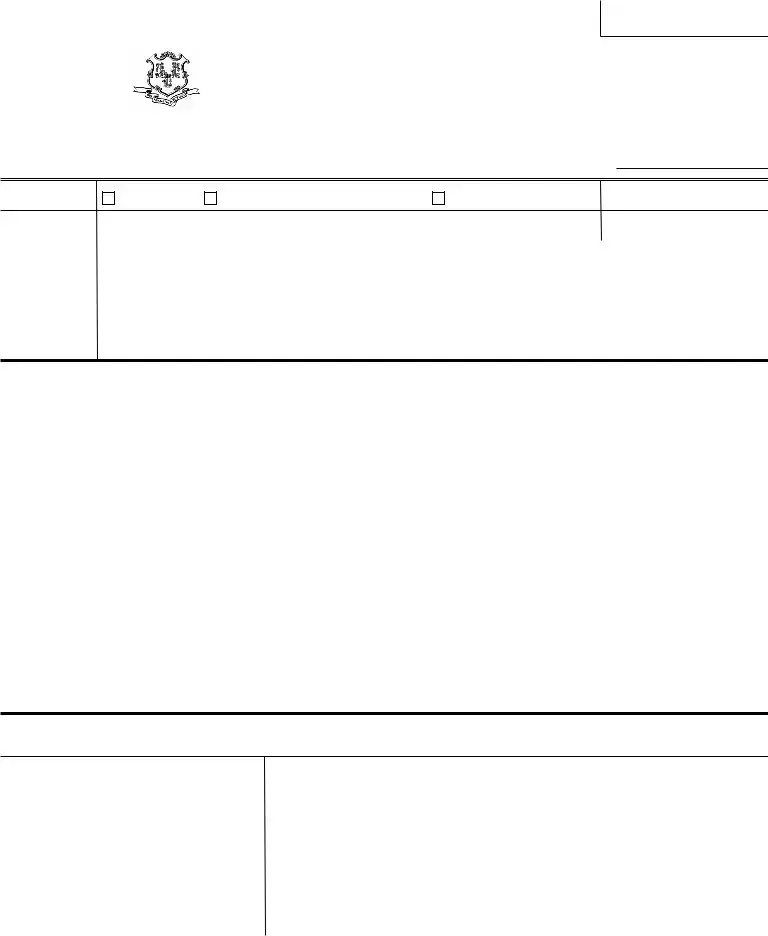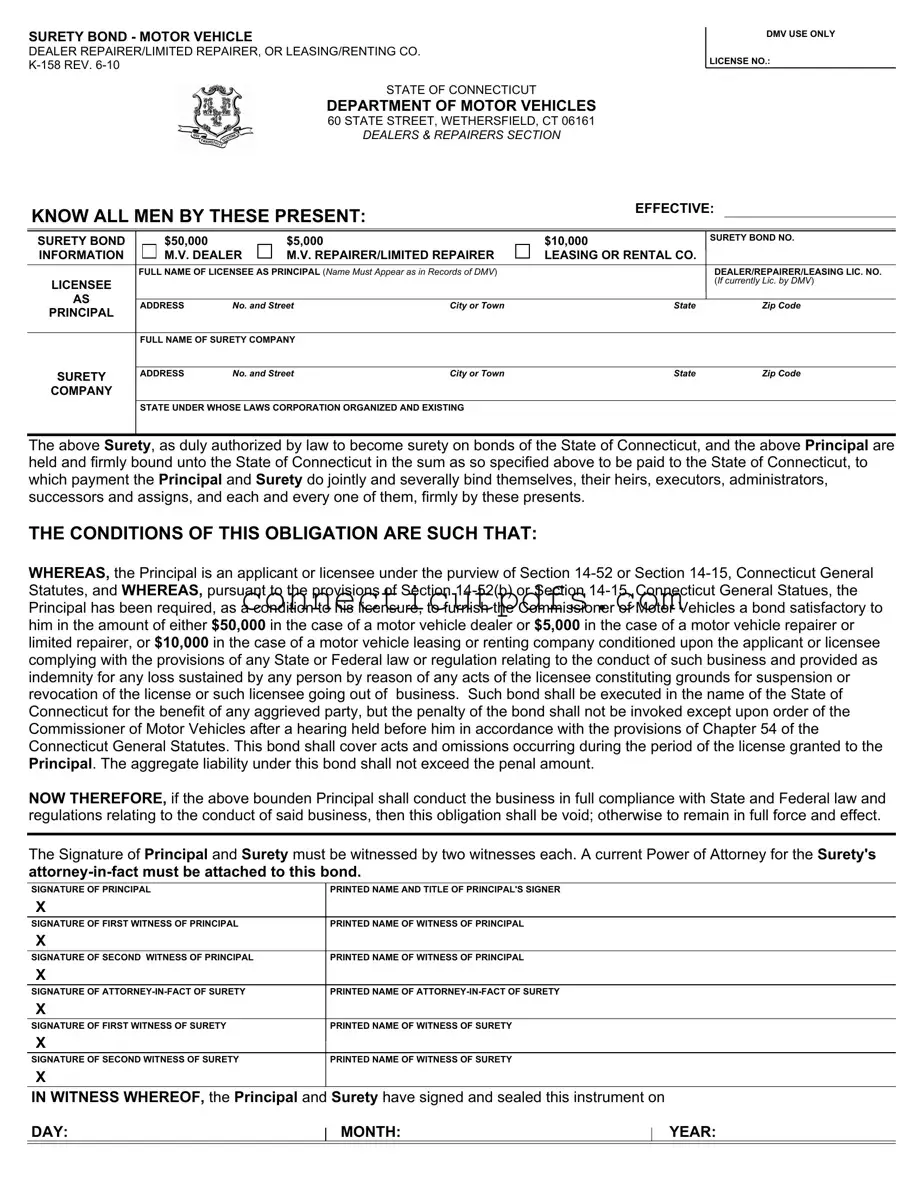Fill Your Connecticut K 158 Form
The Connecticut K 158 form is an essential document for those involved in the motor vehicle industry, specifically for dealers, repairers, and leasing companies. This surety bond serves as a financial guarantee, ensuring compliance with state and federal laws governing the conduct of these businesses. The bond amount varies based on the type of license: $50,000 for motor vehicle dealers, $5,000 for motor vehicle repairers or limited repairers, and $10,000 for leasing or rental companies. By signing this form, the principal—whether a dealer, repairer, or leasing entity—agrees to adhere to all relevant regulations and indemnifies the state against any losses resulting from their actions. The bond is executed in favor of the State of Connecticut and is intended to protect aggrieved parties in the event of misconduct by the licensee. Notably, the bond's penalty cannot be invoked without a formal hearing conducted by the Commissioner of Motor Vehicles, ensuring that due process is followed. This form also requires signatures from the principal and surety, along with witnesses, to validate the agreement. Understanding the implications of the K 158 form is crucial for anyone looking to operate within Connecticut's motor vehicle sector.
Documents used along the form
The Connecticut K 158 form is a crucial document for motor vehicle dealers, repairers, and leasing companies in the state. Along with this form, several other documents are often required to ensure compliance with state regulations. Below is a list of these related forms and documents.
- Power of Attorney: This document authorizes a designated individual to act on behalf of the surety company. It must be current and signed by the surety's attorney-in-fact.
- Surety Bond Agreement: This agreement outlines the terms of the bond, including the obligations of the principal and the surety, and the conditions under which the bond can be enforced.
- License Application: This form is submitted to the Department of Motor Vehicles (DMV) to apply for a motor vehicle dealer, repairer, or leasing license. It includes personal and business information.
- Financial Statements: These documents provide a snapshot of the financial health of the business. They may include balance sheets and profit and loss statements, which help assess the business's ability to meet bond obligations.
- Boat Bill of Sale: This document is essential for transferring ownership of a boat in New York. For more information, you can access the Boat Bill of Sale form.
- Insurance Certificates: Proof of insurance coverage is often required. These certificates demonstrate that the business has the necessary liability insurance to operate legally.
- Background Check Consent Form: This form allows the DMV to conduct background checks on the individuals applying for licenses. It ensures that all applicants meet the necessary qualifications and standards.
These documents work in conjunction with the Connecticut K 158 form to facilitate the licensing process and ensure compliance with state laws. It is essential to prepare and submit all required forms accurately to avoid delays in obtaining or renewing licenses.
Preview - Connecticut K 158 Form

SURETY BOND - MOTOR VEHICLE
DEALER REPAIRER/LIMITED REPAIRER, OR LEASING/RENTING CO.
STATE OF CONNECTICUT
DEPARTMENT OF MOTOR VEHICLES
DMV USE ONLY
LICENSE NO.:
60 STATE STREET, WETHERSFIELD, CT 06161
DEALERS & REPAIRERS SECTION
KNOW ALL MEN BY THESE PRESENT: |
EFFECTIVE: |
|
SURETY BOND INFORMATION
$50,000
M.V. DEALER
$5,000
M.V. REPAIRER/LIMITED REPAIRER
$10,000 |
SURETY BOND NO. |
|
|
LEASING OR RENTAL CO. |
|
|
FULL NAME OF LICENSEE AS PRINCIPAL (Name Must Appear as in Records of DMV) |
|
DEALER/REPAIRER/LEASING LIC. NO. |
|||
LICENSEE |
|
|
|
|
(If currently Lic. by DMV) |
|
|
|
|
|
|
||
AS |
|
|
|
|
|
|
ADDRESS |
No. and Street |
City or Town |
State |
Zip Code |
||
PRINCIPAL |
||||||
|
|
|
|
|
||
|
|
|
|
|
||
|
FULL NAME OF SURETY COMPANY |
|
|
|
||
|
|
|
|
|
|
|
SURETY |
ADDRESS |
No. and Street |
City or Town |
State |
Zip Code |
|
|
|
|
|
|
||
COMPANY |
|
|
|
|
|
|
|
|
|
|
|||
|
STATE UNDER WHOSE LAWS CORPORATION ORGANIZED AND EXISTING |
|
|
|||
The above Surety, as duly authorized by law to become surety on bonds of the State of Connecticut, and the above Principal are held and firmly bound unto the State of Connecticut in the sum as so specified above to be paid to the State of Connecticut, to which payment the Principal and Surety do jointly and severally bind themselves, their heirs, executors, administrators, successors and assigns, and each and every one of them, firmly by these presents.
THE CONDITIONS OF THIS OBLIGATION ARE SUCH THAT:
WHEREAS, the Principal is an applicant or licensee under the purview of Section
NOW THEREFORE, if the above bounden Principal shall conduct the business in full compliance with State and Federal law and regulations relating to the conduct of said business, then this obligation shall be void; otherwise to remain in full force and effect.
The Signature of Principal and Surety must be witnessed by two witnesses each. A current Power of Attorney for the Surety's
SIGNATURE OF PRINCIPAL |
|
PRINTED NAME AND TITLE OF PRINCIPAL'S SIGNER |
|
||
X |
|
|
|
|
|
SIGNATURE OF FIRST WITNESS OF PRINCIPAL |
|
PRINTED NAME OF WITNESS OF PRINCIPAL |
|
||
X |
|
|
|
|
|
SIGNATURE OF SECOND WITNESS OF PRINCIPAL |
|
PRINTED NAME OF WITNESS OF PRINCIPAL |
|
||
X |
|
|
|
|
|
SIGNATURE OF |
|
PRINTED NAME OF |
|
||
X |
|
|
|
|
|
SIGNATURE OF FIRST WITNESS OF SURETY |
|
PRINTED NAME OF WITNESS OF SURETY |
|
||
X |
|
|
|
|
|
SIGNATURE OF SECOND WITNESS OF SURETY |
|
PRINTED NAME OF WITNESS OF SURETY |
|
||
X |
|
|
|
|
|
IN WITNESS WHEREOF, the Principal and Surety have signed and sealed this instrument on |
|
||||
DAY: |
|
MONTH: |
|
|
YEAR: |
|
|
||||
|
|
|
|
|
|
Common Questions
What is the purpose of the Connecticut K 158 form?
The Connecticut K 158 form serves as a surety bond for motor vehicle dealers, repairers, limited repairers, and leasing or renting companies. This bond is a requirement by the Connecticut Department of Motor Vehicles (DMV) for these businesses to ensure compliance with state and federal laws. It provides financial protection for consumers against any losses due to the licensee's actions that may lead to suspension or revocation of their license.
What amounts are specified in the Connecticut K 158 form for different types of businesses?
The bond amounts vary based on the type of business. A motor vehicle dealer must provide a bond of $50,000. For motor vehicle repairers or limited repairers, the required bond amount is $5,000. Leasing or renting companies must furnish a bond of $10,000. These amounts are set to ensure adequate coverage for potential claims against the licensee.
Who needs to sign the Connecticut K 158 form?
What happens if the principal does not comply with state and federal laws?
If the principal fails to comply with the relevant laws and regulations, the surety bond remains in full force. This means that the surety company may be liable for claims made against the bond up to the specified amount. The bond is intended to protect consumers and maintain accountability for the business practices of the licensee.
Is a Power of Attorney required for the surety company?
Yes, a current Power of Attorney must be attached to the Connecticut K 158 form. This document authorizes the attorney-in-fact of the surety company to sign the bond on behalf of the surety. It is essential for validating the surety's commitment to the bond and ensuring that the proper legal authority is in place.
Common PDF Forms
Change of Address Form Ct - Incorrect submissions may delay your address change process.
In addition to the essential details outlined in the Texas Real Estate Purchase Agreement, potential buyers and sellers can further explore their options by visiting Texas Documents, which provides valuable resources and additional forms necessary for a smooth transaction.
H13b Form Ct - Document vehicle information like color and odometer reading on H 110.
Exclusive Right to Represent Buyer Agreement Ct - Provisions regarding the handling of deposits are clearly stated within the agreement.
Guide to Filling Out Connecticut K 158
After gathering all necessary information, you can begin filling out the Connecticut K 158 form. This form is essential for motor vehicle dealers, repairers, or leasing companies to comply with state regulations. Follow these steps to ensure accurate completion.
- Start by entering the license number in the designated space at the top of the form.
- Fill in the effective date of the surety bond.
- Choose the appropriate surety bond amount based on your business type: $50,000 for a motor vehicle dealer, $5,000 for a motor vehicle repairer or limited repairer, or $10,000 for a leasing or rental company.
- Provide the full name of the licensee as it appears in DMV records.
- Enter the license number of the dealer/repairer/leasing company if currently licensed by DMV.
- Complete the address section with the street number, city or town, state, and zip code.
- List the full name of the surety company.
- Fill in the address of the surety company including street number, city or town, state, and zip code.
- Indicate the state under whose laws the surety corporation is organized.
- Sign the form in the designated area as the Principal.
- Have the printed name and title of the Principal’s signer next to their signature.
- Two witnesses must sign next to the Principal's signature. Each witness should also print their name.
- The Attorney-in-Fact of the Surety must sign the form.
- Two witnesses must sign next to the Surety's signature. Each witness should print their name as well.
- Finally, fill in the date of signing with day, month, and year.
Once the form is completed, review it for accuracy. Ensure all signatures and witness names are present. This will help avoid any delays in processing. After that, you can submit the form to the Connecticut Department of Motor Vehicles.
Dos and Don'ts
When completing the Connecticut K 158 form, it is essential to follow specific guidelines to ensure accuracy and compliance. Below is a list of actions to take and avoid during the process.
- Do ensure that the full name of the licensee appears exactly as it does in DMV records.
- Do provide accurate addresses for both the principal and the surety company.
- Do include the correct surety bond amount based on your business type.
- Do have the signatures of both the principal and the surety witnessed by two individuals each.
- Don't leave any sections of the form blank; all required fields must be filled out.
- Don't forget to attach a current Power of Attorney for the surety's attorney-in-fact.
